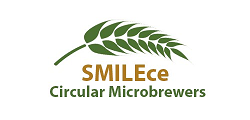SMILEce QUESTIONNAIRE (SMILEce CAS)


We kindly invite you to assess the circularity of your microbrewery with a questionnaire and get a free CAS Report and expert advice that will be tailored to your needs based on your report.
Microbreweries can make an important contribution to achieving meaningful environmental goals and systemic change.
The SMILEce CAS enables you to assess your current circular business potential and commitment to the circular transformation in your organisation.

How can SMILEce Circularity Assessment Score help your microbrewery thrive by becoming more circular?
- Develop your business skills to sustain enterprise and employment and compete effectively against the global multinational beer producers.
- Stay updated on the best available practices and techniques in respect of sustainability within the brewing sector
- Develop new competences and gain competitive advantege in the European micro brewing sector and encourage the positive contribution that European beer can make to the sustainable economy
- Reinforce your knowledge of the important link between, brewing, agriculture and the natural environment
- Involve you in knowledge creation and exchange in the fields of brewing, malting and fermentation science within the increasing environmental constraints of the ‘European Green Deal’
Thank you for joining our initiative!
About the SMILEce project:
The SMILEce is an Erasmus+ project that targets the ever-evolving craft beer industry in Europe. SMILEce is offering incumbents and new entrants, exposure to new techniques, culture and ideas from the circular economy which has recently gained traction in European policy-making as a positive, solutions-based perspective for achieving economic development within increasing environmental constraints.
Please, note that all collected information is kept confidential and is used for educational, research and academic purposes only.

Funded by the European Union. Views and opinions expressed are however those of the author(s) only and do not necessarily reflect those of the European Union or the European Education and Culture Executive Agency (EACEA). Neither the European Union nor EACEA can be held responsible for them.
